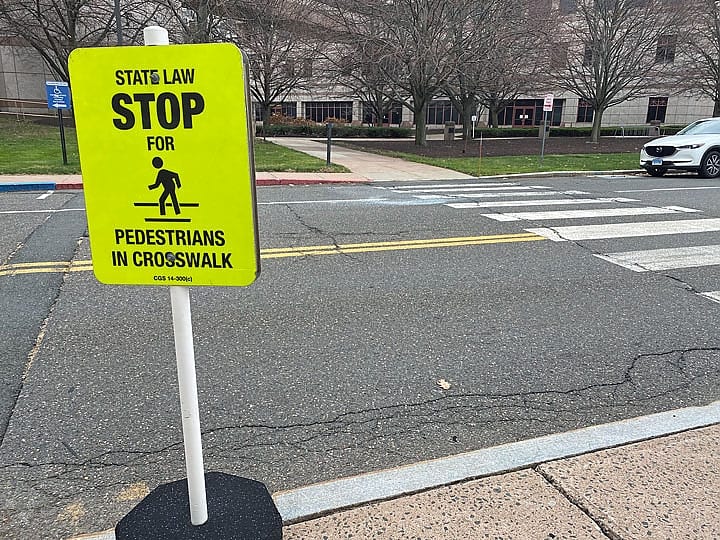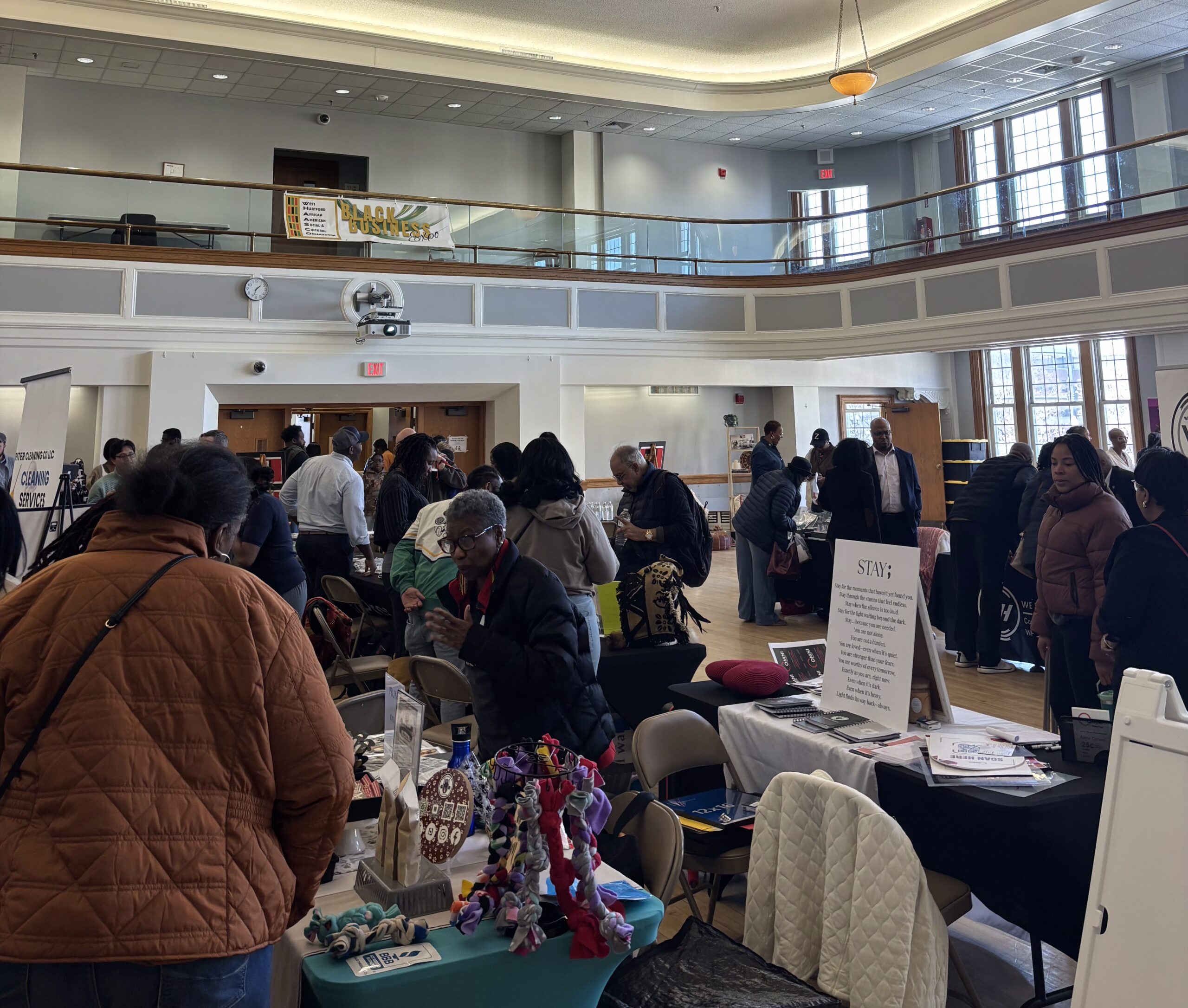Transportation Co-Chair Plans Aggressive Pedestrian Safety Agenda

Audio By Carbonatix

Courtesy of CTNewsJunkie.com
Initiatives are likely to include giving municipalities more flexibility to set speed limits, and changing the laws governing crosswalks.
By Hugh McQuaid, CTNewsJunkie.com
The legislature’s Transportation Committee will consider an aggressive pedestrian safety agenda next year including proposals for allowing automated speed enforcement cameras and more serious penalties for distracted driving, one of the panel’s co-chairman said Tuesday.
It has been a dangerous year to be a pedestrian in Connecticut. According to Real Hartford blogger Kerri Provost, at least 52 pedestrians and six cyclists have died after being struck by vehicles in the state this year alone.
Rep. Roland Lemar, a New Haven Democrat who co-chairs the Transportation Committee, said the problem is not confined to Connecticut and has been growing across the country for some time. But he said no one anticipated that pedestrian and cyclist fatalities would rise to the levels they have in recent years. And in most cases, those deaths boil down to one of two factors: the speed of the motorists and whether or not that motorist was paying attention, he said.
“The reality is, a car, a 2,000-pound vehicle with every safety enhancement of the last 20 years being made toward the drivers of the vehicle – not the pedestrians around them – coming down the road at 30 miles an hour on a local street, that is a recipe for disaster,” he said Tuesday.
Lemar said he is planning an “aggressive pedestrian safety agenda for this coming year.” And some of the proposals he plans to raise have a good shot at passage.
An initiative to give municipalities more flexibility to set speed limits within their borders appears likely to have the backing of the state Transportation Department, as does a change to a state law governing crosswalks. The proposal would eliminate the need for pedestrians to step into the road in order to be granted the right of way at a crosswalk. Instead, they would just need to signal their intent to cross. Both bills were poised to pass this year when the pandemic prematurely ended the session.
Lemar conceded that some of his other proposals may be tougher sells. He plans to raise legislation authorizing speed enforcement cameras, which could photograph and send fines to drivers travelling over a set speed.
In the past, the legislature has considered a similar proposal aimed at ticketing drivers running red lights at intersections. Despite several attempts, lawmakers never passed that concept. Lemar said he now views speed cameras as a more effective option when aimed at drivers traveling “excessively above the speed limit.”
“Maybe we do a couple pilot programs to see how it works but we really need to bring down the average traffic speed on a lot of these roadways because it’s no longer surprising when you hear there’s been another fatality on our roadways. It doesn’t surprise anyone anymore,” he said.
Lemar is also looking to change the culture around distracted driving, which he likened to driving under the influence. He said it took time for people to begin treating drunk driving like a serious problem.
Although distracted driving already carries hefty fines in Connecticut, ranging from $150 on the first offense to $500 on the third offense, he said drivers should be risking their licenses when they decide to answer a text rather than watch the road.
“We need to make it so if you are on your cell phone driving that’s just as bad as drunk driving. In fact, I am more concerned in my neighborhood about someone driving while looking at their cell phone than I am about people under the influence,” he said.
“I don’t know how far I can go with that, but if you have a couple of distracted driving infractions, I want you to lose your license. That is a serious offense,” he said.
Lemar said he expected “huge pushback” on the proposal but planned to schedule public hearings to chronicle the dangers of distracted driving.
Reached Tuesday by phone, Sen. Carlo Leone, a Stamford Democrat who co-chairs the committee with Lemar, said he was open to reviewing his partner’s proposals.
“It remains to be seen if there’s enough support for some of those ideas,” he said, noting that red light camera proposals have been controversial in the past and similar bills are likely to remain controversial. He said he would also wait and see how any new distracted driving change was written.
In 2019, Leone authored a bill that could have imposed $20 fines on pedestrians for “distracted walking” or stepping into a street while using a cell phone. On Tuesday he said that although his bill became controversial, he still believes that pedestrians should be part of the solution.
“I think we have to put some ownership on pedestrians. They need to know the rules of the road as well as drivers. I’m all for increasing pedestrian safety but both parties need to participate in whatever the solutions are,” he said.
Asked about rising pedestrian fatalities on Monday, Gov. Ned Lamont said he would consider legislative proposals to curb the trend. He suggested that many motorists have been driving more dangerously during the pandemic. He said people should drive carefully even if they are frustrated.
“We saw it in the spring where there was so much less driving. The people who were driving, were driving like a bat out of hell. They were going fast. We had some really severe accidents related there,” Lamont said. “I’m not sure we can do it all by policing.”

EDITOR’S NOTE: Coverage of the 2020 Multimodal and Transit Summit, as well as a follow-up series on related transportation issues, is being partially underwritten by the Transport Hartford Academy at the Center for Latino Progress.
Underwriting is funding for journalism that will be reported and produced independently, without prior review by the funder before publication.
Republished with permission from CTNewsJunkie.com, all rights reserved.
Like what you see here? Click here to subscribe to We-Ha’s newsletter so you’ll always be in the know about what’s happening in West Hartford! Click the blue button below to become a supporter of We-Ha.com and our efforts to continue producing quality journalism.




In most cases it is the pedestrian or cyclist who does not look before crossing the road. The pedestrians just walk out without looking because they have been taught through the use of school busses that traffic stops for them, and cyclists do not obey the rules of the road.